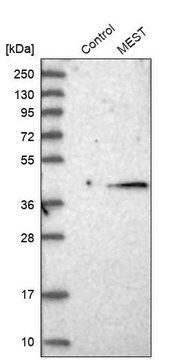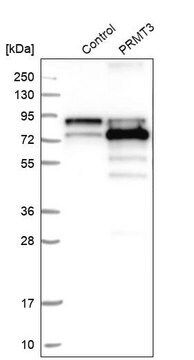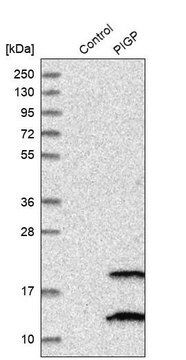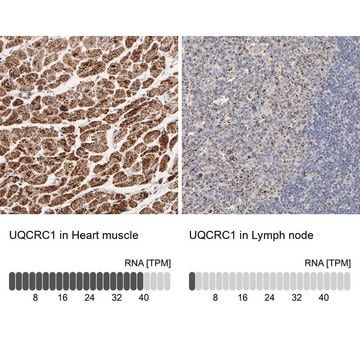ZRB1897
Anti-UTX Antibody, clone 4G9 ZooMAb® Rabbit Monoclonal
recombinant, expressed in HEK 293 cells
Manufacturer: Sigma Aldrich
Synonym(S): Lysine-specific demethylase 6A;EC:1.14.11.68;Histone demethylase UTX;Ubiquitously-transcribed TPR protein on the X chromosome;Ubiquitously-transcribed X chromosome tetratricopeptide repeat protein;[histone H3]-trimethyl-L-lysine(27) demethylase 6A, KDM6A
Select a Size
| Pack Size | SKU | Availability | Price |
|---|---|---|---|
| 25 μL | ZRB1897-25-μL | In Stock | ₹ 20,810.01 |
| 4 X 25 μL | ZRB1897-4-X-25-μL | In Stock | ₹ 49,479.36 |
ZRB1897 - 25 μL
In Stock
Quantity
1
Base Price: ₹ 20,810.01
GST (18%): ₹ 3,745.802
Total Price: ₹ 24,555.812
biological source
rabbit
Quality Level
200
recombinant
expressed in HEK 293 cells
conjugate
unconjugated
antibody form
purified antibody
antibody product type
primary antibodies
clone
4G9, recombinant monoclonal
description
4G9 Clone
product line
ZooMAb® learn more
form
lyophilized
Description
- General description: We are committed to bringing you greener alternative products, which adhere to one or more of The 12 Principles of Green Chemistry.This antibody is Preservative-free, produced without the harm or sacrifice of animals and exceptionally stable to allow for ambient shipping and storage if needed and thus aligns with "Waste Prevention", "Designing Safer Chemicals" and "Design for Energy Efficiency". Click here for more information.
- Specificity: Clone 4G9 is a ZooMAb® Rabbit recombinant monoclonal antibody that specifically detects Lysine-specific demethylase 6A (KDMA6/UTX). It targets an epitope within 19 amino acids from the internal region.
- Immunogen: KLH-conjugated linear peptide corresponding to 19 amino acids from the internal region of human Lysine-specific demethylase 6A (KDMA6/UTX).
- Application: Quality Control TestingEvaluated by Western Blotting in HeLa cell lysate.Western Blotting Analysis: A 1:1,000 dilution of this antibody detected UTX in HeLa cell lysate.Tested applicationsWestern Blotting Analysis: A 1:1,000 dilution from a representative lot detected UTX in HaCat and COS-1 cell lysate.Immunocytochemistry Analysis: A 1:1,000 dilution from a representative lot detected UTX in HeLa cells.Immunohistochemistry (Paraffin) Analysis: A 1:1,000 dilution from a representative lot detected UTX in human bone marrow tissue sections.Note: Actual optimal working dilutions must be determined by end user as specimens, and experimental conditions may vary with the end userEvaluated by Western Blotting in HeLa cell lysate.Western Blotting Analysis: A 1:1,000 dilution of this antibody detected UTX in HeLa cell lysate.
- Target description: Lysine-specific demethylase 6A (UniProt: O15550; also known as EC:1.14.11.68, Histone demethylase UTX, Ubiquitously-transcribed TPR protein on the X chromosome, Ubiquitously-transcribed X chromosome tetratricopeptide repeat protein, [histone H3]-trimethyl-L-lysine(27) demethylase 6A, KDM6A, UTX) is encoded by the KDM6A (also known as UTX) gene (Gene ID: 7403) in human. UTX is a histone demethylase that specifically demethylates lysine 27 of histone H3 and plays a central role in histone code. It is shown to demethylate trimethylated and dimethylated, but not monomethylated H3 lysine 27. It mediates muscle regeneration through its demethylase activity, while it regulates mesoderm differentiation of embryonic stem cells and mammary gland development independent of its demethylase activity. It also plays a role in regulating brown adipocyte thermogenic program. Its levels are shown to be up-regulated during brown adipocyte differentiation and by cold exposure in both brown and white adipose tissue in mice, indicating its potential role in thermogenesis. Mutations in KDM6A gene are a causative factor in Kabuki syndrome that is characterized by congenital mental retardation, postnatal dwarfism, large prominent earlobes, a cleft or high-arched palate, scoliosis, and other abnormalities. This ZooMAbZooMAb® recombinant monoclonal antibody, generated by our propriety technology, offers significantly enhanced specificity, affinity, reproducibility, and stability over conventional monoclonals. (Ref.: Zha, L., et al. (2015). J. Biol. Chem. 290(41); 25151-25163; Lederer, D., et al. (2012). Am. J. Hum. Genet. 90(1); 119-124).
- Physical form: Purified recombinant rabbit monoclonal antibody IgG, lyophilized in PBS, 5% Trehalose, normal appearance a coarse or translucent resin. The PBS/trehalose components in the ZooMAb formulation can have the appearance of a semi-solid (bead like gel) after lyophilization. This is a normal phenomenon. Please follow the recommended reconstitution procedure in the data sheet to dissolve the semi-solid, bead-like, gel-appearing material. The resulting antibody solution is completely stable and functional as proven by full functional testing. Contains no biocide or preservatives, such as azide, or any animal by-products. Larger pack sizes provided as multiples of 25 μL.
- Reconstitution: 300 μg/mL after reconstitution at 25 μL per vial. Please refer to guidance on suggested starting dilutions and/or titers per application and sample type.
- Storage and Stability: Recommend storage of lyophilized product at 2-8°C; Before reconstitution, micro-centrifuge vials briefly to spin down material to bottom of the vial; Reconstitute each vial by adding 25 μL of filtered lab grade water or PBS; Reconstituted antibodies can be stored at 2-8°C, or -20°C for long term storage. Avoid repeated freeze-thaws.
- Legal Information: ZooMAb is a registered trademark of Merck KGaA, Darmstadt, Germany
- Disclaimer: Unless otherwise stated in our catalog or other company documentation accompanying the product(s), our products are intended for research use only and are not to be used for any other purpose, which includes but is not limited to, unauthorized commercial uses, in vitro diagnostic uses, ex vivo or in vivo therapeutic uses or any type of consumption or application to humans or animals.
SAFETY INFORMATION
WGK
WGK 1





